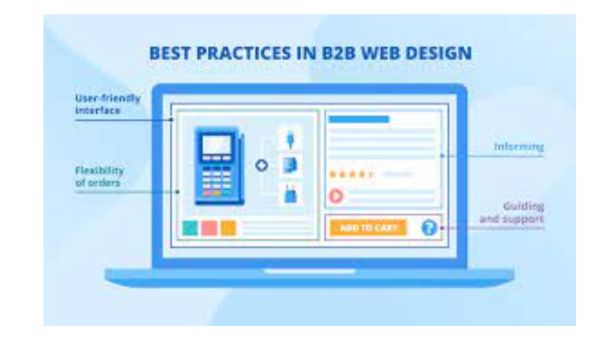Looking to develop a B2B ecommerce website that stands out in search engine results and drives traffic to your business? Look no further! Our expert managers offer comprehensive SEO services tailored to B2B ecommerce websites’ unique needs.
In this article, we’ll explore the ins and outs of B2B ecommerce website development and share our top tips for optimizing your site for search engines. With our guidance, you can achieve higher rankings, increase visibility, and attract more qualified leads to your B2B ecommerce website.
What is B2B Ecommerce Website Development?

B2B ecommerce website development involves creating an online platform that allows businesses to sell their products or services to other businesses via the Internet. B2B ecommerce websites typically include features like product catalogs, pricing and ordering systems, and customer management tools.
The B2B ecommerce website development aims to create a seamless and efficient online buying experience for business customers while streamlining the sales and fulfillment process for the selling business. Businesses can expand their reach, increase sales, and improve customer satisfaction by providing a user-friendly online platform.
Why is SEO important for B2B Ecommerce Websites?
SEO (Search Engine Optimization) is essential for B2B ecommerce websites because it helps increase visibility and drive organic traffic. In today’s digital age, most B2B buyers begin their purchasing journey with a search engine query, and if your website doesn’t appear in the search results, you risk missing out on potential sales.
Optimizing your website for relevant search terms and improving its overall search engine ranking can increase your chances of being discovered by prospective customers.
SEO also plays a critical role in establishing your B2B ecommerce website as a trusted and authoritative source of information. When your site ranks highly in search engine results pages (SERPs), it signals to potential customers that your business is credible and trustworthy. Additionally, by optimizing your site for search engines, you can improve the user experience for your visitors by making your site more accessible and easy to navigate.
Overall, SEO is critical to any B2B ecommerce website development strategy. By prioritizing search engine optimization, you can increase visibility, drive traffic, establish credibility, and drive more sales for your business.
How to Conduct Keyword Research for B2B Ecommerce Websites?
Effective keyword research is crucial in optimizing a B2B ecommerce website for search engines. Here are some steps to follow:
- Start with brainstorming: Begin by brainstorming a list of keywords and phrases relevant to your business, products, and target audience.
- Use keyword research tools: Keyword research tools like Google Keyword Planner, Ahrefs, and SEMrush can help you identify additional relevant keywords and provide data on their search volume and competition level.
- Analyze competitors: Look at the keywords and phrases your competitors rank for and consider whether those terms would be relevant to your business.
- Consider long-tail keywords: Long-tail keywords are longer and more specific keyword phrases that often have lower search volumes but can be easier to rank for. Consider incorporating these into your content strategy.
- Prioritize intent-based keywords: Focus on intent-based keywords relevant to your business and aligning with the searcher’s intent. These keywords can help drive qualified traffic to your website.
- Analyze data: Analyze data from your website analytics to see which keywords drive traffic to your site and adjust your keyword strategy accordingly.
By following these steps, you can conduct effective keyword research for your B2B ecommerce website and optimize your content to rank higher in search engine results pages.
What are the Best Practices for On-Page SEO for B2B Ecommerce Websites?

On-page SEO refers to optimizing individual web pages to rank higher in search engine results pages and drive more relevant traffic to your B2B ecommerce website. Here are some best practices for on-page SEO:
- Conduct keyword research: Identify relevant keywords and incorporate them into your website’s meta titles, descriptions, and headers.
- Optimize product pages: Include detailed product descriptions, high-quality images and videos, and customer reviews to improve the user experience and encourage engagement.
- Optimize URLs: Use descriptive URLs that include relevant keywords, making it easy for search engines and users to understand the page’s content.
- Utilize internal linking: Link to relevant pages on your website within your content to improve navigation and user experience.
- Optimize website speed: Ensure your website loads quickly, as slow load times can negatively impact search engine rankings and user experience.
- Implement structured data markup: Implement structured data markup to provide search engines with additional information about your website and improve the display of your search results.
- Optimize for mobile devices: Ensure your website is optimized for mobile devices, as more and more users are accessing the internet from their phones.
By following these best practices, you can optimize your B2B ecommerce website for search engines and improve the user experience for your visitors.
What are the Benefits of Creating a Blog for B2B Ecommerce Websites?
Here are some benefits of creating a blog for B2B ecommerce websites:
- Regularly publishing high-quality blog content can help drive more traffic to your website through search engines and social media.
- Blogging can help improve your search engine rankings by providing search engines with fresh and relevant content.
- By sharing your expertise and insights in your industry, you can establish your B2B ecommerce website as a thought leader and trusted resource.
- Blogging can help you connect with your customers on a deeper level by providing valuable content that addresses their pain points and needs.
- By providing informative and engaging content that positions your products or services as the solution to your customer’s problems, you can drive more sales for your business.
- Promoting your blog content through social media and other channels can expand your reach and attract new customers to your B2B ecommerce website.
- Blogging is a cost-effective marketing strategy that can help you reach a wider audience and drive more traffic and sales to your website.
What are the Best Link Building Strategies for B2B Ecommerce Websites?

Here are some effective link-building strategies for B2B ecommerce websites:
- Guest blogging
- Broken link building
- Resource link building
- Influencer outreach
- Sponsorship and partnership opportunities
- Building internal links
- Building backlinks through social media
- Competitor link analysis and replication
- Local business directories
- Building links through industry associations and organizations.
How to Monitor and Measure SEO Performance for B2B Ecommerce Websites?

Monitoring and measuring SEO performance is essential to understanding the effectiveness of your B2B ecommerce website’s optimization efforts. Here are some steps to follow:
- Set goals: Establish clear and measurable goals for your SEO efforts, such as increased traffic, higher search engine rankings, or more conversions.
- Use analytics tools: Use tools like Google Analytics to track your website’s traffic, engagement, and conversion rates.
- Monitor keyword rankings: Monitor your website’s rankings to see how your optimization efforts impact your search engine visibility.
- Monitor backlinks: Monitor your website’s backlinks to ensure they are high-quality and relevant, and disavow any toxic links that may harm your SEO performance.
- Use heat maps: Use heat maps to track user behavior on your website and identify areas for improvement in user experience and engagement.
- Conduct regular website audits: Conduct regular website audits to identify technical issues that may impact your website’s search engine visibility and address them promptly.
- Keep up with industry trends: Stay up-to-date with industry trends and algorithm updates to ensure your SEO strategy remains effective.
By following these steps and regularly monitoring and measuring your SEO performance, you can continuously improve your B2B ecommerce website’s search engine visibility and drive more relevant traffic and conversions.
What are Common SEO Mistakes to Avoid for B2B Ecommerce Websites?
Here are some common SEO mistakes to avoid for B2B ecommerce websites:
- Keyword stuffing or over-optimization
- Ignoring meta tags and descriptions
- Not optimizing for mobile devices
- Not using internal linking to connect related content
- Slow website loading times
- Lack of fresh and relevant content
- Ignoring user experience
- Not optimizing images and videos
- Neglecting local SEO opportunities
- Poor website architecture and navigation
- Not utilizing structured data markup
- Ignoring social media marketing
- Focusing solely on search engine rankings rather than user engagement and conversions.
Conclusion
SEO is crucial for the success of B2B ecommerce websites, as it can help improve search engine rankings, drive more traffic and conversions, and establish the website as a thought leader in the industry.
By following best practices for on-page SEO, conducting effective keyword research, implementing link-building strategies, and monitoring and measuring SEO performance, B2B ecommerce websites can continuously improve online visibility and attract more relevant traffic.
Our expert manager services can help businesses optimize their SEO strategies and achieve their online marketing goals. Contact us today to learn more about our services and how we can help your B2B ecommerce website thrive online.
